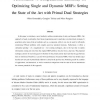Free Online Productivity Tools
i2Speak
i2Symbol
i2OCR
iTex2Img
iWeb2Print
iWeb2Shot
i2Type
iPdf2Split
iPdf2Merge
i2Bopomofo
i2Arabic
i2Style
i2Image
i2PDF
iLatex2Rtf
Sci2ools
113
Voted
CVIU
2008
2008
Performance vs computational efficiency for optimizing single and dynamic MRFs: Setting the state of the art with primal-dual st
In this paper we introduce a novel method to address minimization of static and dynamic MRFs. Our approach is based on principles from linear programming and, in particular, on primal dual strategies. It generalizes prior state-of-the-art methods such as -expansion, while it can also be used for efficiently minimizing NP-hard problems with complex pair-wise potential functions. Furthermore, it offers a substantial speedup - of a magnitude ten - over existing techniques, due to the fact that it exploits information coming not only from the original MRF problem, but also from a dual one. The proposed technique consists of recovering pair of solutions for the primal and the dual such that the gap between them is minimized. Therefore, it can also boost performance of dynamic MRFs, where one should expect that the new new pair of primal-dual solutions is closed to the previous one. Promising results in a number of applications, and theoretical, as well as numerical comparisons with the sta...
| Added | 10 Dec 2010 |
| Updated | 10 Dec 2010 |
| Type | Journal |
| Year | 2008 |
| Where | CVIU |
| Authors | Nikos Komodakis, Georgios Tziritas, Nikos Paragios |
Comments (0)

